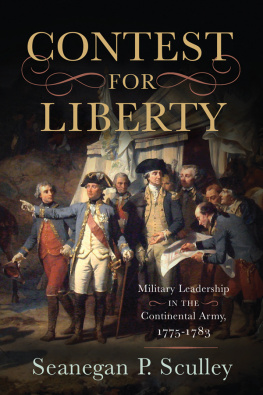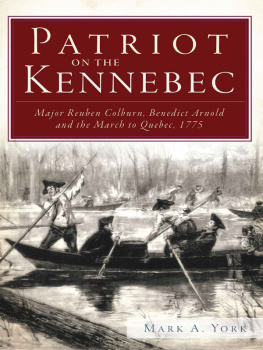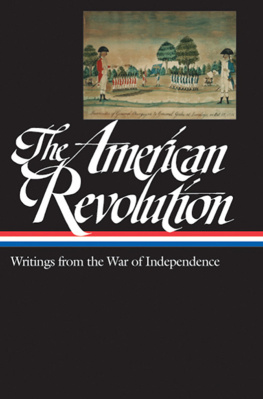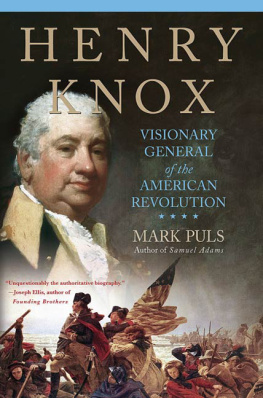Washingtons Partisan War,
17751783
Mark V. Kwasny
Washingtons
Partisan War,
17751783
The Kent State University Press
Kent, Ohio, & London, England
1996 by The Kent State University Press, Kent, Ohio 44242
All rights reserved
Library of Congress Catalog Card Number 96-14559
ISBN 0-87338-546-2
ISBN 0-87338-611-6 (pbk.)
Manufactured in the United States of America
03 02 01 00 99 98 5 4 3 2
Library of Congress Cataloging-in-Publication Data
Kwasny, Mark V. (Mark Vincent), 1959
Washingtons partisan war, 17751783 / Mark V. Kwasny.
p. cm.
ISBN 0-87338-546-2 (cloth : alk. paper)
ISBN 0-87338-611-6 (pbk. : alk. paper)
1. New York (N.Y.)HistoryRevolution, 17751783Campaigns.
2. Middle Atlantic StatesHistoryRevolution, 17751783 Campaigns. 3. NEW York (State)MilitiaHistoryRevolution, 17751783. 4. Washington, George, 17321799Military leadership.
1. Title.
E230.5.N4K9 1996
973.3'447dc20 9614559
British Library Cataloging-in-Publication data are available.
MANY PEOPLE helped me greatly during the course of writing this book and deserve my thanks and gratitude. The staffs at several locations made the job of finding and using sources much easier. In particular, I want to thank the staff members of the New Jersey State Library, Trenton, New Jersey; the New-York Historical Society and New York Public Library in New York City; the New York State Library, Albany, New York; and the Connecticut State Library and Connecticut Historical Society, Hartford, Connecticut. In addition, the library staff at The Ohio State University, and especially the people who run the interlibrary loan office, were very helpful.
Everyone at the Kent State University Press has been helpful and supportive of my efforts. I would like to thank in particular Dr. John T. Hubbell, director, Julia Morton, senior editor, Linda Cuckovich, assistant editor, and Beth Wilson, the copyeditor, for all of their advice. Their efforts helped me produce a better book.
For financial support, I owe the Center of Military History, United States Army, a huge debt for the Dissertation Year Fellowship that enabled me to travel and type full time as I wrote the original draft. In addition, the Graduate School and College of Humanities of The Ohio State University provided fellowships that let me concentrate on my personal work.
Ron McLean of the Graphics Services at The Ohio State University provided me with a set of maps that nicely complement the text. His detailed work, his ability to concentrate while I sat looking over his shoulders, and his willingness to put up with my constant little corrections all contributed to the making of a great set of maps.
While writing the original draft, I received advice and criticism from Dr. Harry Coles (who sadly passed away before this book reached completion) and Dr. Paul Bowers, who read each chapter and provided a valuable critique of my work. Dr. Alan Aimone and Dr. Ira Gruber discussed with me the original ideas and supported my request for the armys fellowship. Dr. Clyde Ferguson read my manuscript for The Kent State University Press and provided extensive analysis and criticism, including over thirty handwritten pages of notes, advice, and corrections. His painstaking review helped immensely during the revision of the manuscript. Dr. Allan R. Millett, my adviser and mentor throughout my graduate studies, provided invaluable assistance from the first step. I owe much to his support, recommendations, and criticisms throughout the long process of producing this book.
Finally and most importantly, I must thank my family for putting up with me and my book over the past several years. To Napoleon, who kept me company during the countless hours typing and reading, I appreciated your company and wish you were still by my side. My children, Katherine and Michael, could not understand why I spent so many hours in front of a computer, but they accepted my work as necessary. Most of all, I dedicate this book to my wife, Barbara, who put up with my need to travel and spend many hours on the book, helped edit the early drafts, listened to my endless stories about the Revolutionary War, and kept encouraging me when it all seemed to be too much work. Thank you for your constant support and understanding of my history obsession.

THE SMOKE from the opening clashes of the war at Lexington, Concord, and Bunker Hill had barely settled when the newly appointed colonial commander in chief, George Washington, arrived outside British-held Boston. Within a matter of days, he expressed his opinion of the New England militiamen who filled the colonial army to the Continental Congress: All the General Officers agree that no Dependence can be put on the Militia for a Continuance in Camp, or Regularity and Discipline during the short Time they may stay. Almost eight years later, as the war slowly ground to a halt, Washington expressed a far different opinion: The Militia of this Country must be considered as the Palladium of our security, and the first effectual resort in case of hostility. These two viewpoints summarize the dual nature of the militia in the American Revolutionary War, and of Washingtons employment of the militia throughout that war. They are not contradictory but complementary statements. Washington never changed his opinion as stated in the first quote, but he came to recognize the truth as expressed in the second quote.
During the eight and one-half years of warfare, the colonial, and later state, militia forces filled a critical need in the military policy and strategy of the rebellious Americans. Though their activities in the South and in upstate New York have been recognized, even in the middle colonies of Connecticut, New York, and New Jersey,
The war in the middle colonies was a partisan war. The campaigns of the regular forces of Britain and America are well known, but these armies did not operate through an empty countryside. Surrounding them were swarms of small detachments consisting of militia and regular soldiers maneuvering around the massed formations and creating a swirl of activity through which the armies moved and fought. That the American Revolutionary War in the South was as much a partisan war as it was a clash of regular field armies is well recognized, but it was just as true in Connecticut, New York, and New Jersey.
The Whig militia forces that existed at the commencement of the war were at the heart of this partisan activity in the North. These militia units were what today would be called the reserves, to which the colonists turned when an immediate crisis arose. From the beginning the political and military leaders of the rebellion saw a clear distinction between militiamen and Continental soldiers, who served in the regular army under the control of Washington and the other Continental generals. Militiamen remained under the authority of their state governments and served with the army only on a temporary basis.














